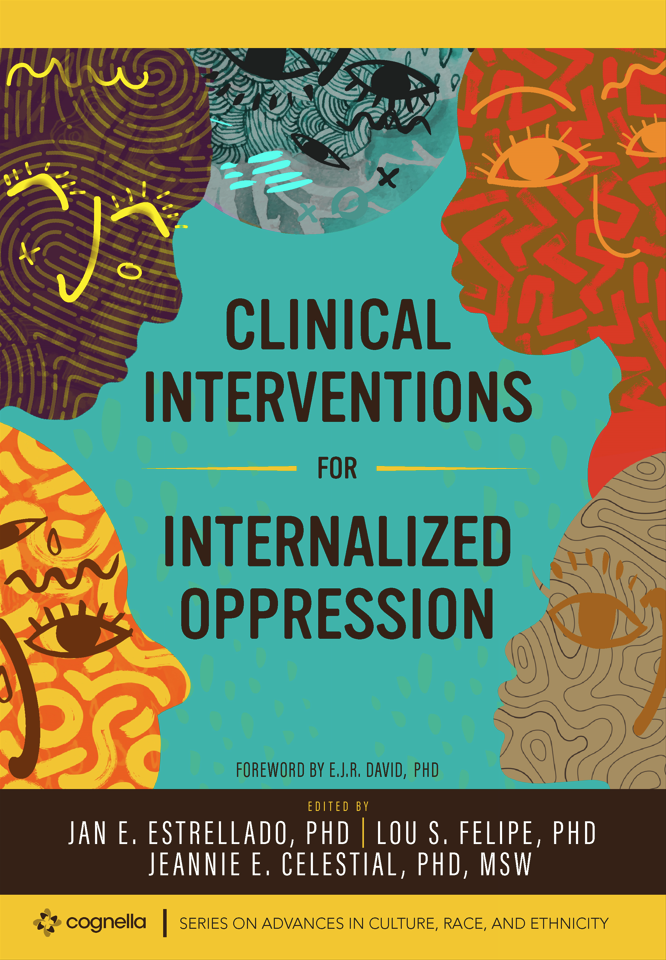New Release – Clinical Interventions for Internalized Oppression Edited by Jan E. Estrellado, Ph.D., Lou S. Felipe, Ph.D., and Jeannie E. Celestial, Ph.D., M.S.W.

The book introduces readers to conceptual frameworks for internalized oppression and the interactive nature of systems of privilege, power, and oppression within individual and collective experiences. Later chapters identify where different facets of internalized oppression may present themselves in broad clinical domains. Readers explore the ways in which internalized negative beliefs emerge from historic oppression and how they present and manifest.
Throughout, queer and/or Black, Indigenous, and People of Color (BIPOC) practitioner spotlights, clinical vignettes, somatic reflections, self-reflection, and discussion questions deepen readers’ learning experiences and promote real-world application.
Clinical Interventions for Internalized Oppression is part of the Cognella Series on Advances in Culture, Race, and Ethnicity. The series, co-sponsored by Division 45 of the American Psychological Association, addresses critical and emerging issues within culture, race, and ethnic studies, as well as specific topics among various ethnocultural groups.
From the Foreword:
“Drs. Jan Estrellado, Lou Felipe, and Jeannie Celestial have done a remarkable job of assembling a group of scholars, clinicians, and community leaders who do not see their personal connection to internalized oppression as a limitation, but instead see it as a strength that both elevates their work and makes it deeply impactful. Addressing internalized oppression is hard work, but for many of us this is not just our hard work; it is also our heart’s work. Sure, readers should be prepared to apply the contents of this book in the professional context, but they should also be prepared for deep personal reflection, transformation, and growth.”
—E. J. R. David, Ph.D., author of Brown Skin, White Minds, editor of Internalized Oppression: The Psychology of Marginalized Groups, and professor of psychology at University of Alaska Anchorage
Chapters and Contributors Include:
Chapter 1: Introduction
Jan E. Estrellado, Ph.D., Lou Collette S. Felipe, Ph.D., and Jeannie Estella Celestial, Ph.D., M.S.W.
Chapter 2: An Intersectional Approach
Lou Collette S. Felipe, Ph.D., Tamba-Kuii M. Bailey, Ph.D., and Niyeli Herrera, B.A.
Chapter 3: Therapeutic Alliance
Jan E. Estrellado, Ph.D., and Lou Collette S. Felipe, Ph.D.
Chapter 4: Issues in Supervision
Jeannie Estella Celestial, Ph.D., M.S.W., and Jan E. Estrellado, Ph.D.
Chapter 5: Case Conceptualization
Jeannie Estella Celestial, Ph.D., M.S.W., and Jan E. Estrellado, Ph.D.
Chapter 6: Treatment Planning
Kenedy Ramos, M.A., Keali’i Kauahi, M.A., Jan E. Estrellado, PhD, Julii M. Green, Ph.D., and Jeannie Estella Celestial, Ph.D., M.S.W.
Chapter 7: Internalized Racism: Manifestations, Mental Health, Implications, and Clinical Interventions
Emilie Loran, M.S., and E. J.R. David, Ph.D.
Chapter 8: Internalized Sexism
Marli Corbett-Hone, M.Ed., Morgan J. Benner, B.S., Natania S. Lipp, B.S., and Nicole L. Johnson, Ph.D.
Chapter 9: Internalized Homophobia, Biphobia, and Transphobia
Amy Prescott, M.S., Rose K. Dhaliwal, M.S., Samantha LaMartine, Psy.D., and Nadine Nakamura, Ph.D.
Chapter 10: Exploring the Impact of Internalized Ableism in Clinical Practice
Anthea A. Gray, Psy.D., Katlin R. Schultz, Psy.D., Rebecca P. Cameron, Ph.D., Linda R. Mona, Ph.D., and Kristina M. Moncrieffe, Psy.D.
Chapter 11: Internalized Classism
William Ming Liu, Ph.D., and Klaus E. Cavalhieri, Ph.D.
Chapter 12: Conclusion
Lou Collette S. Felipe, Ph.D., Jeannie Estella Celestial, Ph.D., M.S.W., and Jan E. Estrellado, Ph.D.
About the Editors
Jan E. Estrellado, Ph.D. (all pronouns) is an assistant professor at the California School of Professional Psychology, Alliant International University, San Diego campus. Their research examines race, ethnicity, sexual orientation, and gender identity in trauma therapy.
Lou S. Felipe, Ph.D. (she/they) is an assistant professor at the University of Colorado School of Medicine, where she provides culturally responsive, trauma-focused psychotherapy. Her research examines the intersectional identity experiences of marginalization, particularly at the intersection of race, ethnicity, gender, and sexuality with a unique specialization in Pilipinx American psychology.
Jeannie E. Celestial, Ph.D., M.S.W. (she/her) is a licensed clinical psychologist, consultant, and speaker in the San Francisco Bay Area. She integrates somatic, brain-based, and culturally-rooted approaches to treat trauma and facilitate holistic wellness, specializing in Filipinx and BIPOC communities.
Learn more about the book, request a digital review copy, or purchase a copy: https://titles.cognella.com/clinical-interventions-for-internalized-oppression-9781793526205

